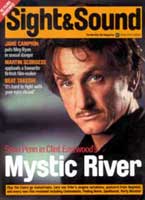
Bringing up alimony
Film of the Month: Intolerable Cruelty

The Coens' Intolerable Cruelty may become their most popular movie yet, but it offers little to fans of their subversive imagination, says Ben Walters
Not since the sexual Reaganomics of Working Girl have the operations of capital and desire been as closely aligned as they are in the Coen brothers' latest picture. As the promotional tagline assures us, its leads superslick matrimonial attorney Miles Massey (George Clooney) and his sparring partner, serial divorcée Marylin Rexroth (Catherine Zeta-Jones) "can't keep their hands off each other's assets." But where Melanie Griffith and Harrison Ford got all steamed up over the account books, the suggestion here is that the libido and the bottom line can't be satisfied simultaneously: Miles and Marylin's burgeoning romance is set against their cool efficiency at profiteering from the detritus of love hence his thrilled astonishment when, following their eventual union, she tears up a pre-nuptial agreement in an apparent fit of amorous abandon. "Darling," he gasps. "You're exposed!"
Intolerable Cruelty assiduously avoids such vulnerability. The wilful imagination that marks each of the Coens' previous pictures the delight in mundane absurdity, the flights of genre-subverting fancy, the painstaking construction of heightened but internally consistent worlds is suppressed in favour of a straighter, more accessible tone. In fact, they have delivered a mainstream romantic comedy, a star vehicle with the potential to earn more than the rest of their oeuvre combined. If this seems a remarkable shift for film-makers more accustomed to accusations of self-indulgent elitism not a charge anyone will level at Cruelty it's worth remembering that the film is itself the product of a number of marriages.
It is the Coens' first project based on someone else's idea: a decade ago they refashioned the screenplay as a job of work; it was subsequently attached to Ron Howard and then Jonathan Demme (who planned to cast Julia Roberts and Hugh Grant) before the Coens signed on to direct following the collapse of another project, To the White Sea. Cruelty is also the first Coens film made with a fellow producer, Howard's partner Brian Grazer. With Apollo 13, The Nutty Professor and Liar, Liar among his credits, the press notes purr, Grazer's movies have generated more than $10 billion. If, after the commercial under-performance of The Man Who Wasn't There, the Coens were pining for the box-office success of O Brother, Where Art Thou?, Grazer's are very attractive assets indeed.
Clooney's casting and performance certainly hint at that precedent: "George decided that his character is a descendant of the guy Everett McGill whom he played in O Brother," Ethan Coen has said. Certainly Massey shares McGill's blend of tricksterish charisma and goofy vanity, along with the legal instincts for storytelling and showboating deployed by TMWWT's Freddy Riedenschneider. Zeta-Jones is also neatly cast, playing at a distance that suggests the emotional quarantine Marylin has chosen as well as her calculating objectivity. The stars' personae are deftly used at once for and against their characters, who are shown to be trapped by the consequences of the successful exercise of their appeal but this in itself brings mixed results. On the one hand they make a nifty courtroom (or restaurant-table) double act, trading surreptitious glances, double takes and passages of barbed banter the measure of anything in The Hudsucker Proxy or its sources. But Marylin and Miles are too wrapped up in one-upmanship for their mutual fascination to translate into a sympathetic romance: they aren't so much lovebirds as rattlesnakes caught in each other's gaze. When, in the final reel, the plot degenerates into a slapdash slapstick caper (pegged on a secret will and an asthmatic assassin), there's little to do but sit back and roll with the sight gags with increasingly contrived plot points of dubious motivation piling up against each other, emotional engagement isn't an option.
The problem, then, isn't that the Coens have chosen to essay a straight genre piece but that they haven't pulled it off a failing all the more surprising given the sophisticated play with genre tropes in many of their pictures, from the dumb noir of Blood Simple and The Big Lebowski to O Brother's reworking of the Odyssean-quest narrative. Unlike Jerry Maguire, Erin Brockovich or even Titanic, Cruelty does not succeed in pushing the emotionally exploitative buttons it aims at: when Miles gives a soupily scored encomium of love to a divorce-attorneys' convention it's hard to know where to look but it probably shouldn't be at his winsome, adoring assistant Wrigley, who cries at weddings and gives open-mouthed screams of panic at too-regular intervals.
Still, the film is never less than enjoyable, and the plot's eventual derailment could charitably be chalked up to the ambitious pace and momentum it maintains for the first 80 minutes. And importantly for a comedy it's often hilarious, stocked with bits of miscellaneous business that keep the ball in the air without adding up to very much: a Will Hay-style passage of linguistic logic-chopping, butcherings of Simon and Garfunkel standards, a magazine called Living without Intestines. The Coens' superior dialogue is also evident (as when Marylin's friends talk up a potential match for her, reporting "He's in fish." "He IS fish." "Well, he's tuna"), and the names are, as usual, a treat: Rex Rexroth, Sarah Batista O'Flanagan Sorkin and Heinz, the Baron Krauss von Espy all pop up, while Bonnie and Donovan Donaly could double date with Bernie and Verna Bernbaum from Miller's Crossing.
In most other areas, however, admirers of the Coens' previous work are likely to be disappointed by the laziness with which many of the familiar tropes are revisited. Clooney's Massey is a case in point: an exaggerated retread of Everett McGill, he illustrates the way Cruelty's eagerness to capitalise on O Brother's success leads it to slide from contextualised silliness into extrovert wackiness. (One of the final scenes has Massey and Wrigley tiptoeing around a house in a pantomime gait the Three Stooges might have considered over-egged.)
The supporting characters one of the major joys of any other Coens film are here largely uninspired and devoid of any sense of inner life. Cedric The Entertainer's Gus Petch, a voyeuristic private dick prone to crowing "I'm gonna nail yo' ass!", looks decidedly lame against brother shamuses such as M. Emmet Walsh's Visser (Blood Simple) or even Jon Polito's minor scene-stealer from Lebowski. Similarly, the senior partner of Miles' law firm, a cadaverous echo of a man called Herb Myerson, is a sad parody of the Coens' other decrepit authority figures. David Huddleston's Jeffrey Lebowski was funny because of the play-off between his physical condition and his perverse relationship with power; Myerson is merely a grotesque, ensconced in a rococo-furnished grotto decked out with stalactite-like drips and drains. Alongside the indignities of old age, the Coens have always been alive to the humour of violence, but where previously they located the joke in the reality of pain and its infliction, here the pratfalls are inconsequentially cartoonish even when fatal. Time and again instances of cruelty prove more tolerable than you'd imagine.
There's a flat, sheeny quality to Cruelty, a sensation of being offered a calculatingly packaged consumer product rather than a window into a strange new milieu with its own look, feel and rules. This is the first Coen brothers film with a contemporary setting since Raising Arizona and the only one which feels it could conceivably take place in the audience's world. Many of their regular collaborators deliver conspicuously muted contributions: Roger Deakins' photography is spatially confident but rarely beautiful or exciting; Carter Burwell's score is sprightly but sometimes sentimental; Mary Zophres' costumes are impeccable but low on flair. And the tastefully opulent interiors give little sense of character in comparison with, say, Barton Fink's hotel room or Hi and Ed's home in Arizona. That the mise en scne for the Vegas scenes which should surely be a gift to the Coens' sensibility - feels so pedestrian is an indication of the self-regulation at work.
The Coens' match with Grazer will probably turn out to be a profitable one: Cruelty stands up fine as Friday-night fun and if the aim were to produce a slice of escapist entertainment then it can be said to succeed, if not excel. But with their strengths best realised outside the generic mainstream, it's to be hoped the Coens will pocket their share of the proceeds and think again about the pursuit of desire.
